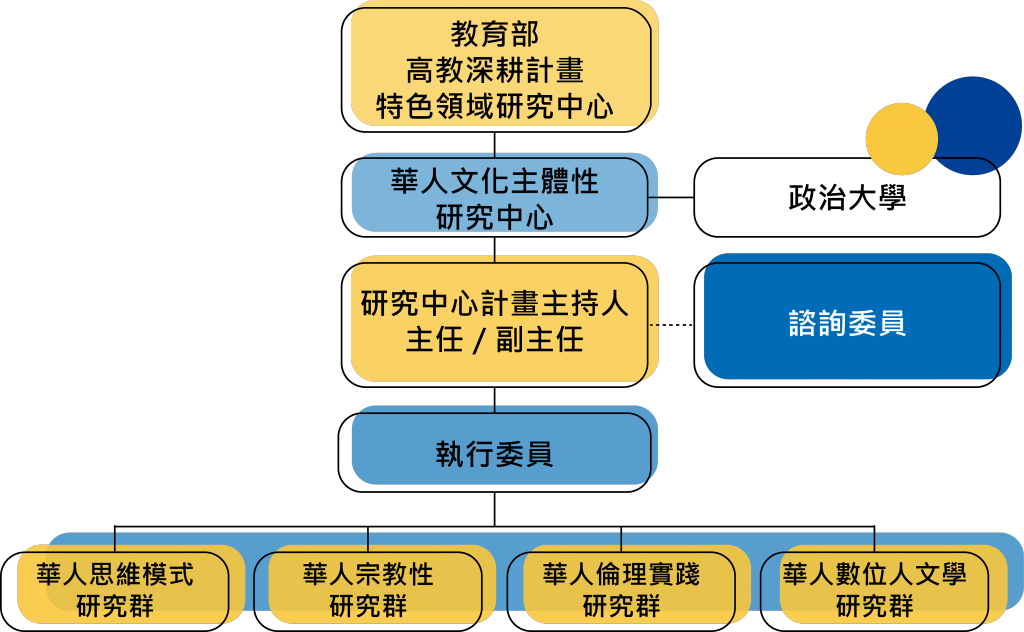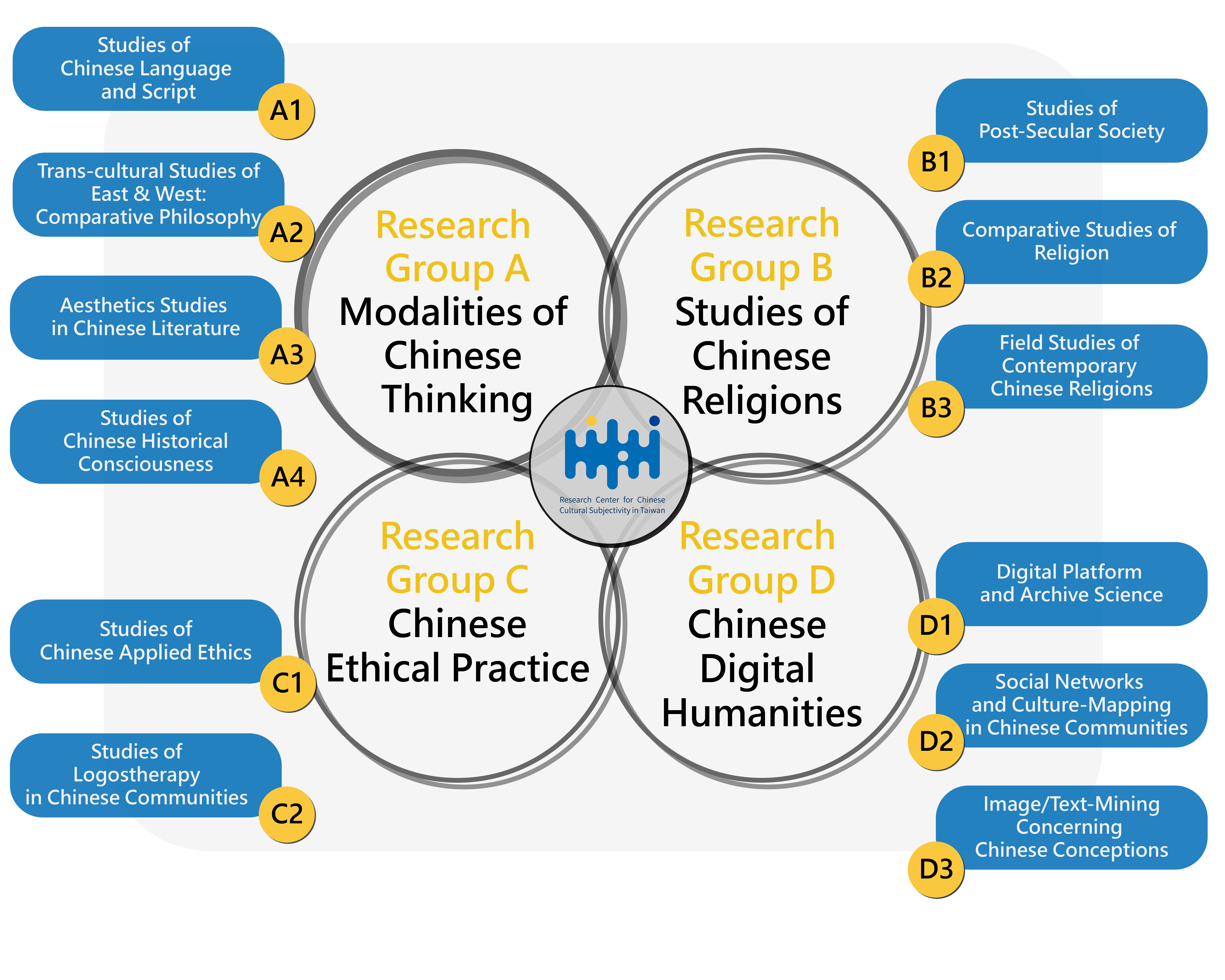組織架構
本中心為教育部高教深耕計畫的特色領域中心項目,計畫主持人為政大歷史系張廣達講座教授,目前設置中心主任為林遠澤教授,以及掌理個別研究群的四位副主任﹔蔡源林教授、馬愷之教授、鄭文惠教授、陳婉真教授
“Research Center of Chinese Cultural Subjectivity” (CCS) of National Chengchi University (NCCU) was established in 2018 as a Featured Areas Research Center Program within the framework of the Higher Education Sprout Project by the Ministry of Education (MOE) in Taiwan, expecting to operate till 2021. CCS comprises four main research groups and twenty-six researchers from NCCU, and four post-doctoral fellows.
四大研究群並包括有 26 位政大專任教授共同擔任研究團隊成員
本中心設有執行委員會與諮詢委員會:執行委員會負責規劃與執行中心業務,諮詢委員會則延攬具有高度影響力的知名學者擔任委員,針對本中心之發展策略與目標,提供相關諮詢與興革意見。
本研究中心之研究團隊成員,主要包括本校領域有傑出研究表現之學者,並聚焦在延攬已有優秀表現、且具有潛力成為卓越學者之國內外年輕學者,經由資深學者搭配年輕優秀學者共同合作研究,實現優秀人才的傳承和永續培養。
The principle investigator is prof. ZHANG Kuan-da (chair professor of dept. of History), the director is prof. LIN Yuan-tze (prof. and chair of dept. of Philosophy), and with four deputy directors from each main research group: prof. Kai Marchal (dept. of philosophy), prof. TSAI Yuan-lin (graduate institute of religious studies), prof. CHEN Wan-chen (MA program of counseling and guidance), and prof. CHENG Wen-huei (dept. of Chinese literature).
CCS has set up an Executive Committee composed of twenty-six researchers to help to facilitate cohesiveness by keeping everyone in the loop with alignment and decision-making. It has also created an Advisory Committee composed of distinguished scholars to offer guidance and advice for the development and future orientation of CCS.

為充分展開研究的廣度與深度,本中心四大研究群又各自依問題性質,再區分出二至四個研究小組,以分別從十二個不同的向度,全面地分析當代華人文化主體性的核心要素。
CCS aims to explore diverse perspectives on Chinese culture in contemporary circumstances and to integrate the research of our various specialists to develop a sense of what the essentials of being “Chinese” and being a “human being” in global contexts are . CCS has four main research groups as below.

Research Group A – Modalities of Chinese Thinking
Research Group A is designed to explore the inseparable relationship between thinking and language with special attention to the characteristics of the Chinese language and script in the context of linguistics, philosophy, and history. Owing to the fact that the Chinese language and script serve as the most important medium for representing the essentials of Chinese culture, we expect to redevelop its subjectivity and its community by focusing on various perspectives on interpreting Chinese culture since the May Fourth New Cultural Movement.
Research group A has four sub-groups as following:
- A1 – Studies of Chinese Language and Script
- A2 – Trans-cultural Studies of East & West: Comparative Philosophy
- A3 – Aesthetic Studies in Chinese Literature
- A4 – Studies of Chinese Historical Consciousness
Research Group B – Studies of Chinese Religions
In facing the phenomena of conflicts and crises caused by the rise of religious fundamentalism certain issues concerning how religions are drawn into the public realm must be examined. Research group B is designed to reconsider the implications of belief and concern for worldly conditions in Chinese Religions as well as the phenomena concerning the reception of foreign religions in Chinese communities. It is designed to investigate the way Chinese religions operate with respect to their belief systems by doing textual analysis, field studies, and adopting new digital technologies. Through these methods and those of comparative religious studies we hope to help establish dialogue among different religious communities.
Research group B has three sub-groups as following:
- B1 – Studies of Post-Secular Society
- B2 – Comparative Studies of Religion
- B3 – Field Studies of Contemporary Chinese Religions
Research Group C – Chinese Ethical Practice
Research Group C is designed to reconsider the basis of Daoist philosophy for offering new perspectives for sustaining natural ecosystems. It will also provide philosophical and Buddhist viewpoints on therapeutics such as issues concerning hospice care, an aging society, etc. It will also trace the implications of Confucian ethics for contemporary civil society.
Research group C has two sub-groups as follows:
- C1 – Studies of Chinese Applied Ethics
- C2 – Studies of Logostherapy in Chinese Communities
Research Group D – Chinese Digital Humanities
Research group D is designed to develop interdisciplinary research and its applications by applying digital technologies and the methods of humanities. Text-analyzing and data-mining will be used to study important Chinese conceptions in different spatio-temporal phases. It will also work with the aid of a geographic information systems and data-visualization so that new horizons and approaches to humanities and interdisciplinary research are revealed.
Research group D has three sub-groups as follows:
- D1 – Digital Platform and Archive Science
- D2 – Social Networks and Culture-Mapping in Chinese Communities
- D3 – Image/Text-Mining Concerning Chinese Conceptions

A. 華人思維模式研究群
本研究群目標是重新思考思想與語言之間密不可分的關係。人在說話或寫字時,總是隱約受到其使用語言的影響。而漢語與漢字做為承載中華文化最重要的符號媒體,無疑與華人的思維方式有密切的關係,它更是形塑整個東亞文明的共通基礎。本研究群探索漢語與漢字所代表的語言世界觀,從語言學、哲學、美學以及史學等研究方法去研究華人思維的特殊性,注重五四新文化運動以降華人文化的種種再詮釋,以便澄清華人在二十一世紀如何重新型塑自我文化的主體性以及跨區域的想像共同體。
B. 華人宗教性研究群
本研究群針對文明衝突與原教旨主義興起等宗教重返公共領域的現象,反思華人宗教著重人間現世與和諧包容的信仰意義,並透過文獻分析與田野調查的方法,結合數位人文新科技,探索華人宗教體系的運作模式,以建構宗教比較研究與相互對話的理論思考架構。本研究群建立在整合政大原本的跨學科宗教研究既有成果的基礎之上,由政治學系郭承天教授與社會學系邱炫元教授籌劃宗教重返的後世俗社會研究;由宗教研究所蔡源林與黃柏棋教授籌劃世界宗教傳統的比較研究;由宗教研究所謝世維教授與中文學系高莉芬教授籌劃當代華人宗教(含神話)的田野調查研究。
C. 華人倫理實踐研究群
本研究群結合本校「輔導與諮商碩士學位學程」,以及中研院民族學研究所的「本土心理與文化療癒研究群」,意在興發傳統文化思想資源,提供保護自然生態的道家精神基礎;面對臨終關懷與科技物欲造成的心靈空虛,提供佛教的意義治療學觀點;因應長照與社區治療需求,提供由儒家人際網絡構成的支援系統。本研究群由哲學系鄭光明教授與宗教所李玉珍教授籌組華人應用倫理研究團隊,由教育系陳婉真教授、哲學系汪文聖教授籌組華人意義治療學研究團隊。
D. 華人數位人文學研究群
本研究群目標透過數位人文學研究方法,運用數位技術與人文學科研究進行對話,發展跨學科、跨領域的研究與應用。本研究群將透過文本分析方法,分析文本中的詞彙變遷,並從中探索人文化主體性觀念的形成與演變,及國族建構與文化認同等重要議題;或藉由地理資訊系統(Geographic Information System)的輔助,進行視覺化(visualization)呈現與時空分析,為人文學研究開拓新的研究視野;以及建構一個以華文為主的數位平台,提供多元的分析工具,亦能將本中心的相關研究成果與研究資料數位化,不僅有利於人文社會學者的研究,更能為人文學研究本身,提供新的方法論與研究進路。
